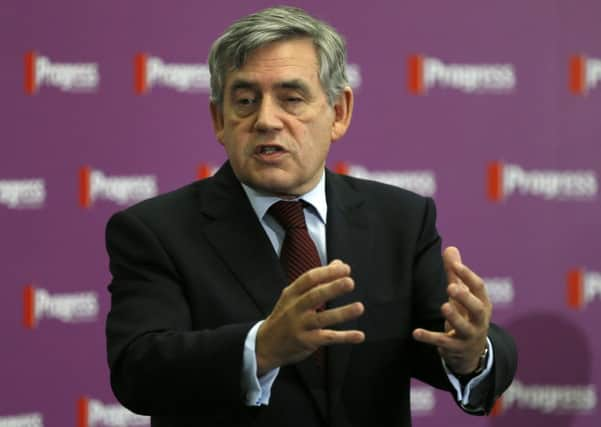Scottish independence: Brown’s home rule timetable


The former prime minister said a No vote would be the “starting gun” for further powers for Holyrood, with a new Scotland Act drawn up to give the country greater control over finance, welfare and taxation.
The three non-nationalist parties are today expected to back Mr Brown’s plan, which was described by Yes campaigners last night as “panic and desperation” in response to recent polls.
Advertisement
Hide AdAdvertisement
Hide AdMr Brown, speaking at the Loanhead Miners Welfare and Social Club in Midlothian last night, said work would begin on the new legislation on 19 September, the day after the vote.
He envisioned a “command paper” to be published by the present UK government setting out all the proposals for change no later than the end of October.
He said the “timetable for strengthening the Scottish Parliament” would include a white paper on a new Scotland Act with proposals to devolve key chunks of tax and welfare policy from Westminster to Holyrood, published in time for St Andrew’s Day – with the draft laws around 25 January, Burns Night.
Mr Brown, who has asked House of Commons Speaker John Bercow for a full debate on extending devolution, said: “By the end of October, just over five weeks after the referendum, we seek a command paper that sets out all the plans, including the agreed ground that unites us, and the issues that need to be resolved.
“By the end of November, we seek Heads of Agreement on a new Scotland Act published in a white paper, or its equivalent, [and] will report back on an intensive month of consultation with Scottish civic society and with the groups who were engaged in talks during Scottish Constitutional Convention, who, like the Scottish Parliament, will be able to scrutinise and challenge the proposals.
“By the end of January 2015, we seek draft clauses ready for legislative enactment as the new Scotland Bill and Scotland Act. I want to see draft clauses giving effect to these policies as soon as possible because I want legislation to happen as soon as possible. And from November to January, we would continue to consult the Scottish Parliament.”
Scottish Labour’s devolution commission has backed handing the bulk of control over income tax to Holyrood, which would see MSPs given powers to vary tax by up to 15p, while the Conservatives have approved plans to make the Scottish Parliament responsible for all income tax and accountable for 40 per cent of the money it spends. The Liberal Democrats have backed a plan to allow Holyrood to raise and spend most of its own taxes.
Other senior UK Labour figures also made high-profile interventions in the referendum debate yesterday, as the party moved to harden its stance on delivering new powers to the Scottish Parliament.
Advertisement
Hide AdAdvertisement
Hide AdShadow chancellor Ed Balls, on a campaign visit to Aberdeen, said getting a radical package of new powers through Westminster after a No vote would be a priority for Labour if it wins the 2015 General Election.
He said the proposals to deliver the majority of income tax responsibilities would be in the first Queen’s Speech if Labour wins in 2015 – a timetable that would mean the transfer of powers could be approved within a year.
Mr Balls said: “This week we have made it absolutely clear that we are going to implement the devolution commission’s proposals on tax.
“We’re making it absolutely crystal clear that legislation will be in the first Queen’s Speech. People want to know that this is definitely going to happen and I think people know that.”
On the campaign trail in Edinburgh, Better Together leader Alistair Darling said the three non-nationalist parties were “in agreement” over extending tax, spending and welfare powers for Scotland if it remained in the Union.
Mr Darling said: “The three non-nationalist parties have already put forward a range of powers. All three are agreed that there needs to be further powers given to the Scottish Parliament. What we are talking about is the timetable for implementing that. There are decisions on detail which have to take place, but the big question we have got to answer before that is are we staying in the United Kingdom or leaving?”
Speaking on behalf of Yes Scotland in response to Mr Brown’s speech, former Scottish Labour Party chairman and Labour for Independence campaigner Bob Thomson said: “This smacks of utter panic and desperation by the No campaign as they lose their lead in the polls.
“Gordon Brown is in no position to offer anything – he is a back-bench MP, and the Tories are in power at Westminster.
Advertisement
Hide AdAdvertisement
Hide Ad“The choice is to vote Yes for all the powers we need to create jobs and protect Scotland’s NHS – or No for a Tory-led talking shop.
“The people of Scotland will not trust the Tories to deliver powers that in any event fall far short of what we need.”